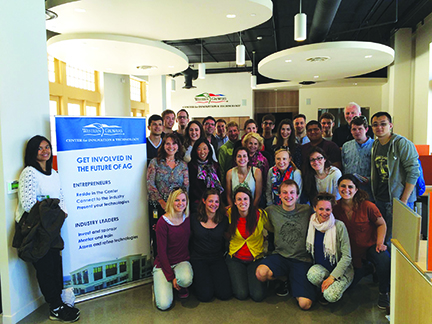Since opening its doors last winter in Salinas, Western Growers’ Center for Innovation & Technology (WGCIT) has quickly created a reputation of agtech excellence throughout the local community, state and nation.
The Center is home to 21 start-up companies that are already developing groundbreaking innovations and achieving impressive results. With the $30,000 Wells Fargo grant recently received, WG will be able to provide scholarships to additional startups looking to join the Center and develop creative solutions to the biggest challenges facing agriculture.
In addition to helping current startups grow and launch their products, the WGCIT is playing a role in shaping the next generation of agtech leaders—here and abroad. The Center has already hosted more than 100 students from countries throughout the world, including Switzerland, Spain, Germany, China, India, New Zealand, Japan and the Philippines, in addition to the United States. While touring the Center, these groups of students have had the opportunity to interact with WGCIT innovators to learn about their specific technologies, the real-world issues they are striving to solve and the importance of collaboration.
One of the Center’s main goals is to connect entrepreneurs to WG members to facilitate innovative solutions that directly address the needs of farmers. With diminishing natural and human resources, technology will be the key to helping agriculture feed the growing population. This is where our innovators come in. The startups working out of the Center are making strides in advancing agtech.
Below are the achievements some of our startups have accomplished since joining the WG Center for Innovation & Technology:
California Safe Soil’s pilot program that turns food waste into liquid fertilizer (in just three hours!) recently moved to full-scale commercialization. The firm just finished construction and officially started operating out of their new facility designed to recycle up to 32,000 tons of organic matter per year.
Concentric Power just announced that it will be building a cogeneration plant for Church Brothers and True Leaf Farms. In addition to providing them with high-efficiency energy modules for onsite electric power generation and low temperature refrigeration, Concentric Power also signed a 10-year service contract.
Conservis has added a real-time financial accounting integration feature to its platform of management tools, which allows on-the-ground production data to seamlessly transfer into financial management accounting systems. The new accounting integration increases efficiency and reduces the risk of errors typical of duplicative data entry.
Food Origins is running an active pilot project with Driscoll’s and Fresalva Berry farm on production data collection. The company is also developing technology that would improve the traceability for food safety, which would help identify where issues with hand-harvested crops occur and provide data to prevent further incidences.
GeoVisual Analytics formalized a financing agreement with AI Capital, Taylor Farms and SVG Partners to provide seed funding for the company. The funding will be used to grow its team in Salinas and hire additional agronomic expertise to perfect its mobile imagery collection and artificial intelligence platform designed for specialty crop forecasting.
HeavyConnect recently launched its Pesticide Use Reporting tool in collaboration with the Monterey County Agricultural Commissioner and Hartnell College. Working much like TurboTax for the IRS, this tool provides growers with a simplified portal to collect pesticide information from the field and generate a report that is ready to submit to their respective county.
iFood Decision Sciences launched a data management app called “The Toolbox” during the Forbes AgTech Summit on July 13. The app allows farm personnel to quickly complete field and harvest assessments required under today’s stringent food safety regulations or for third-party audits.
Russell Pacific started using a new pile-driving machine to quickly put solar electric systems in the ground for farmers and complete more installations faster. The company has been able to supply solar technology to more farmers—saving farmers money and allowing them to grow their own energy.
SWIIM System has dramatically expanded its reach in California and is quickly building momentum for new deployments in Colorado and Arizona. SWIIM—which offers software that allows users to lease and transfer unused water rights in real time—has grown so much that it is planning the Series B funding framework six months earlier than originally expected.
Trace Genomics has raised $4 million for its new service, which uses genetic sequencing to identify harmful pathogens found in soil, such as bacteria or fungi.
Wexus recently launched a new feature that allows growers to receive text alerts when their pumps are about to incur high peak energy demand charges. This can potentially save thousands of dollars per pump each month.





